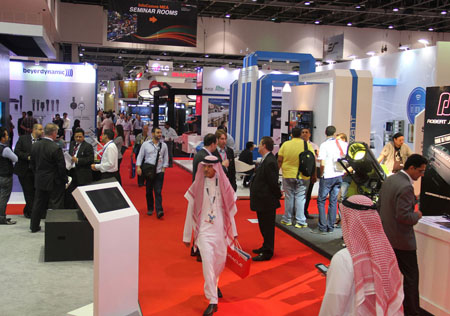The audiovisual market in the Middle East, among the fastest-growing in the world, is set to reach USD 4.63 billion by 2016, according to trade association InfoComm International. Driven by large infrastructure developments such as the World Expo 2020 in Dubai and the 2022 FIFA World Cup Qatar, the MEA audiovisual market is projected to […]
 The audiovisual market in the Middle East, among the fastest-growing in the world, is set to reach USD 4.63 billion by 2016, according to trade association InfoComm International.
The audiovisual market in the Middle East, among the fastest-growing in the world, is set to reach USD 4.63 billion by 2016, according to trade association InfoComm International.
Driven by large infrastructure developments such as the World Expo 2020 in Dubai and the 2022 FIFA World Cup Qatar, the MEA audiovisual market is projected to grow from USD 2.79 billion in 2012 to USD 4.63 billion by 2016, growing annually at rate of 13%, according to the recently released InfoComm 2014 Global AV Market Definition and Strategy Study.
The UAEs audiovisual market is projected to grow from USD 700 million in 2012 to USD 1.24 billion in 2016, making it the fastest-growing and second-largest in the Middle East, according to the InfoComm study. Thanks to a wealth of professional audiovisual expertise, the UAE and Dubai are the regions audiovisual hubs, serving other Middle East markets and beyond.
Boosted by Dubai, the Middle East and Africa region offers strong audiovisual market potential, thanks to strong investment, a young online population, and a low penetration of audiovisual adoption, said Richard Tan, Executive Director, InfoCommAsia Pte Ltd.
Helping the regions audiovisual professionals and distributors understand market opportunities is InfoComm MEA 2014, the regions leading trade exhibition and summit on the audiovisual market, organised by InfoCommAsia and the Dubai World Trade Centre.
InfoComm MEA 2014, held under the theme of See. Hear. Touch. The Future of Your Business. returns for a fourth year, from 13-16 October 2014, and will be co-located at GITEX Technology Week 2014 at the Dubai World Trade Centre.
Audiovisual technology spans every industry vertical, including education, healthcare, transportation, and media; and covers a wide range of products and services such as displays and digital signage, lighting and sound systems, and media recording and storage equipment.
Audiovisual and IT are increasingly becoming integrated across the Middle East and Africa, with InfoComm MEA 2014 visitors able to learn about how audiovisual technology is being used in various verticals, from entertainment to government, added Richard Tan.
In Dubai, World Expo 2020-related developments are driving demand for audiovisual solutions, especially in entertainment, venues, and events. Mohammed bin Rashid City, to be completed in 2019, will feature the worlds largest shopping mall, a theme park, and more than 100 hotels.
Hotels and shopping centres are heavily investing in the audiovisual solutions to enhance the visitor experience, as the regions retail and hospitality sectors boom. Dubai is the regions leading retail destination, with the Dubai Mall hosting more than 30 million visitors per year.
Government audiovisual spending is also increasing with infrastructure projects such as rail networks and ports. The education market is also extremely important, with universities and schools deploying new technology to meet the digital needs of students and staff.
InfoComm MEA has built a strong following among IT and audiovisual professionals, including systems integrators, distributors and dealers, as well as end-users. Demonstrating the regions audiovisual growth, InfoComm MEA 2013 attracted 14,770 visitors, a 23 per cent increase from InfoComm MEA 2012, with 88 percent being vertical market end users.
The forthcoming InfoComm MEA 2014 will showcase more than 200 exhibitors from over 30 countries. Attendes can also gain valuable insights on technology updates and industry best practices at the concurrent InfoComm MEA Summit taking place alongside the exhibition.
















































































